#average salesforce implementation cost
Explore tagged Tumblr posts
Text
How Much Does A Salesforce Implementation Cost?
So, you want to start using Salesforce! Smart move! But you may be confused by Salesforce Pricing and all the available products. No doubt, Salesforce is as successful as it is due to the flexibility and the customizations it offers. However, customization involves additional fees, so you must research before budgeting. And while Salesforce implementation is very straightforward, knowing the total Salesforce Cost can be a bit of a mystery. The Salesforce License can cost you anywhere from $10,000 to $50,000. And yes, that's quite a broad range. Let's see if we can narrow that pricing down a little. Like many other business software programs, the price depends on the number of users and the level of functionality chosen. Salesforce comes in a variety of basic configurations.
The Salesforce Pricing Model
Generally speaking, across the Salesforce product line, there are four different levels of each offering: Salesforce Essentials, Salesforce Professional, Salesforce Enterprise, and Salesforce Unlimited. Note that only some options are available for all Salesforce products. In addition, there are the Clouds. Salesforce CRM is a cloud-based service that provides connectivity for all team members via the various Clouds.
Essentials - $25 per user per month, billed annually.
Essentials offer a simple set of default features catering to basic sales needs:
Lead management (including web-to-lead capture).Account, contact, and opportunity management.
Sales tasks and event (customer calls and meetings) management.
Sales reporting with configurable reports and dashboards.
Employee collaboration using Chatter (the inner Salesforce chat).Mobile access to Salesforce CRM with Salesforce 1 Mobile app.
Sales process automation with the Process Builder (5 processes per organization).
Among the default features unavailable in the Essentials but valued by mid-sized and large companies are the Products and Price Books features that specify different pricing options for products and services sold to other customer groups like individuals and small and mid-sized businesses.
Also, there are no features for managing contracts, orders, and quotes, which are important for efficient sales operations in companies with an affluent customer base.
There's also no way to create User Profiles, Roles, and Permission Sets that help to control which fields users see within records and define role-based access to CRM data.
Professional - $75 per user per month, billed annually.
Need specific CRM functionality for managing products and price books, quotes, orders, and contracts? For a sales team with more than ten members? The Professional edition will suit you better. The list of the edition's default features includes the same features as for Essentials, plus:
Rule-based lead scoring.
Contract management.
Products and Price Books.
Quote and order management.
Lightning Sync (to synchronize contacts and calendar events between any Microsoft Exchange-connected device and Salesforce).
Sales forecasting (including the mobile forecasting app).
A developer sandbox is used for developing and testing new functionality in a different environment without impacting the production environment.
The functional limitations of the Professional edition are similar to those of the Essentials edition, which lacks the opportunity to customize the solution with code and to automate sales-related processes with code. Salesforce integrations with third-party systems via APIs are possible. However, enabling integrations requires an additional $25 per user/month. This makes the Professional edition a costly option for mid-sized and large companies.
Another helpful feature for significant businesses that the Professional edition lacks is Enterprise Territory Management. The feature helps sales managers to organize groups of accounts and the sales reps assigned to those accounts based on the territorial criteria. It allows the creation of a territory management system, which is extremely helpful for large companies selling their products/services worldwide.
Opportunity Teams and Opportunity Splits are two more features not present in the Professional edition but are essential for mid-sized and large businesses with a few sales teams. The former enables team selling and record access which eliminates the manual sharing of information.
Unlike the Essentials edition, it's possible to create two user profiles per org, two user roles per org, and ten permission sets, which still provides rather limited opportunities to control role-based user access to CRM data and may not be the option for the companies with tens of CRM users.
Enterprise - $150 per user per month, billed annually.
Enterprise has all the capabilities of the Professional edition plus:
Workflow and approval automation.
Opportunity Teams to enable sales reps' collaboration on one deal.
Opportunity Splits to share revenue from a chance between the sales team members, based on their contribution to the deal.
Enterprise Territory Management.
Advanced reporting features (cross filters, joined reports, history tracking).
Unlimited automation capabilities with Process Builder (a point-and-click tool for automating linear workflows).
Unlimited automation capabilities with Flow Builder (a point-and-click tool for automating complex workflows).
The unlimited number of user-profiles and page layouts.
The unlimited number of user roles and permissions.
The unlimited number of record types per object.
Lightning Platform to build and manage applications with point-and-click tools or code.
APIs for integrating Salesforce with third-party systems.
One hundred developer sandboxes for developing and testing new features.
Functional limitations of the Enterprise edition do not impede large-scale organizations from choosing it and are mostly related to customization capabilities. For instance, a limit of 25 Lightning apps can be built on the Salesforce Lightning Platform to make using a Salesforce solution easier for different user groups.
Unlimited - $300 per user per month, billed annually.
The Unlimited edition has extensive capabilities for process automation, customization with Apex code, and integration via APIs available in the Enterprise edition. What makes the edition stand out is the access to Salesforce support and training services, like:
24/7 toll-free support.
Access to premier success resources (a knowledge base, interactive webinars).Access to configuration services performed by a dedicated Salesforce admin.Access to one-on-one coaching sessions with a Salesforce expert.Developer support.
Limitations of the Unlimited edition include the inability to create more than 2000 custom objects, 800 custom fields per object, 200 report types, and 500 validation rules. These limits can hardly hinder the attempts to customize a Salesforce solution for a large-scale enterprise to the needed extent. Still, knowing about them saves you from a misbelief that the edition has truly unlimited capabilities, as its name implies.
In addition to these offerings, the Cloud is an added expense. The Salesforce Service + Sales Cloud adds $25 per month to the above charges.
The Salesforce Marketing Cloud also has additional features and expenses.
Suite 1 for Email, Mobile, and Web Marketing.
The prices depend on the contact and message volume, support email marketing campaigns, and build personalized mobile and web customer journeys.
Suite 2 for Social Media Marketing.
From $1,000 per month for the basic edition to $40,000 for the most advanced version. They are used for improving content marketing and customer engagement in social media.
Suite 3 for Advertising
The price depends on the number of advertising audiences and contacts and is used for targeted advertising, customer segmentation, and using customer data to create and manage powerful one-to-one campaigns.
Suite 4 for B2B Marketing Automation
From $1,250 per month for the basic edition to $40,000 for the most advanced version. It is a toolkit that allows automation, lead generation, tracking, and nurturing.
The Cost Of Salesforce Implementation Services.
Maybe now you think you've got a handle on the Salesforce Implementation services and their cost. To make sure, let's go over the nuts and bolts in a general way.
Take a medium-sized company that plans to implement Salesforce for managing their sales and customer service. They need user licenses for the following:
5 C-level executives (Sales Cloud subscription).Two sales managers (Sales Cloud subscription).Thirty sales reps (Sales Cloud subscription).One customer service manager (Service Cloud subscription).Six customer service agents (Service Cloud subscription).Five marketing managers (Sales Cloud subscription to support their marketing activities with the info on the state of sales).
With the current pricing of Sales and Service Cloud editions, which fits the company's scale and the needed level, the company's total annual fee to Salesforce would probably be:
$88,200 for the Lightning Enterprise edition.$176,400 for the Lightning Unlimited edition.
This is just the annual fee. To implement these services, in other words, take the out-of-the-box Salesforce package and get it up and running. The cost of Salesforce Certified Consultants, Developers, and Support Specialists is a rough estimate. The breakdown is as follows:
Consulting
The hourly rates of freelance consultants would be the approximate cost of a two-week consulting job, maybe $14,000.
Data migration for users with legacy CRM
You'll need data migration services if you're already using a different CRM and want to switch to Salesforce. Data migration is instead a costly affair since it implies several activities before the data import itself. It is necessary to check the data's accuracy first, purge the duplicates, correct the errors and map the data into the Salesforce fields. A conservative estimate might be as high as $10,000.
Customization
The level of customization will depend on the complexity of the company's internal processes. Modifications with point-and-click tools are significantly cheaper than changes introduced with code. The cost of customization is estimated to be around $50,000.
Integration with third-party systems
Let's say the company needs to integrate its Salesforce solution with a SharePoint-based document management system, Outlook, and website. To incorporate all of those third-party systems successfully, the company may need an investment as high as $35,000.
User training
self-learning or instructor-led training, the number of users, their type (end users or technical users, like Salesforce admins), and the hourly rate of a training provider. The training budget is estimated at $10,000.
After-launch support
On average, support continues for three months after the implementation. Again, using the average hourly rates of providers, a reasonable estimate for help comes in at around $45,000.
The Total Cost Of Salesforce
With all the annual expenses on the products and implementation services, the total Salesforce implementation cost would be around $252,200.
If these costs seem high, consider that the Return on Investment for Salesforce has been documented to be over 65% in the first year of use. And the second year, all of the implementation costs disappear. So the ROI in the second year is even greater.
Connect With Rely Services For Better Salesforce Implementation
The benefits far outweigh the costs when considering all the advantages of running Salesforce as your Customer Relationship Management tool. And remember that no single sales tool is as flexible, robust, customizable, or contains anywhere near the abilities of Salesforce CRM. But find out for yourself. Call or contact Rely Services, Certified Salesforce Consultants, for a demo of what Salesforce can do for you and what Rely Services can do to make it a more valuable asset.
#salesforce implementation#salesforce implementation cost#salesforce implementation price#average salesforce implementation cost
0 notes
Link
0 notes
Text
The Business of Happiness: How Investing in Employee Wellbeing Leads to Better Business Outcomes
Introduction
Today’s most successful businesses understand that their greatest asset isn’t technology or capital—it’s their people. Investing in employee wellbeing is no longer a luxury; it’s a strategic necessity. From employee happiness and mental health to workplace happiness and engagement, prioritizing wellbeing directly impacts business performance. In fact, 89% of HR leaders say regular peer feedback and check-ins are vital for success.

Organizations that embed happiness at work into their culture experience higher retention, better innovation, and improved financial outcomes. This article explores the tangible ROI of employee wellbeing through real-world examples and proven strategies.
Enhancing Employee Wellbeing Through Work Environment
"Take care of your employees, and they will take care of your business." The modern workplace must be designed with employee wellbeing at the center. Post-pandemic offices are embracing natural light, clean air, ergonomic design, and employee mental health support systems.
Companies are reimagining offices to cultivate joy at work, with biophilic design, wellness rooms, and collaborative spaces that support both productivity and relaxation.

Competitive Advantage: Companies like Google and Salesforce lead the way by embedding employee engagement strategies into their operations. Their commitment to employee wellbeing differentiates them in talent acquisition and retention.
Brand Value: Organizations known for fostering workplace happiness enjoy stronger brand equity. According to a 2023 Gallup poll, firms with high employee happiness scores also see a 20% uptick in customer satisfaction.
Driving Productivity and Employee Engagement
Engaged employees are not only happier—they’re also more productive. The American Psychological Association reports that well-supported employees are 17% more productive and show 21% higher profitability.
Microsoft’s initiatives such as flexible schedules and mental health days led to a 25% productivity boost. Such examples prove that when businesses support employees’ mental health in the workplace, they gain committed, creative, and high-performing teams.
Reducing Turnover and Retaining Talent
High turnover drains resources and morale. SHRM estimates the average cost to replace an employee is 6–9 months of their salary.
Companies like SAS Institute, which offer comprehensive wellness programs, experience a turnover rate of just 4%. By implementing tailored employee engagement and retention strategies, organizations reduce churn and preserve institutional knowledge.
Improving Health and Reducing Absenteeism
Investing in physical and mental health has measurable outcomes. Johnson & Johnson saved $250 million in healthcare costs over a decade through robust wellness initiatives. Unilever’s Employee Assistance Program led to a 33% drop in absenteeism by directly supporting employees' mental health in the workplace.
Fostering a Culture of Happiness at Work
A workplace that prioritizes employee wellbeing promotes trust, collaboration, and innovation. Zappos thrives on a culture that values happiness at work, which translates into stellar customer service and high morale.
Employees like Sarah, from a leading tech firm, say:
“Since our company revamped its wellbeing initiatives, I feel genuinely valued. It’s made a real difference in my productivity and overall happiness.”
Enhancing Customer Satisfaction Through Happy Teams
There's a strong correlation between employee happiness and customer service. Companies like Southwest Airlines and Ritz-Carlton have built reputations for excellent service by ensuring their employees are supported and satisfied.
Driving Innovation Through Employee Wellbeing
Wellbeing fuels creativity. Adobe’s Kickbox program and 3M’s innovation culture are built on the belief that joy at work leads to bold ideas. Companies that support risk-taking and mental space for creativity gain an edge in innovation.
Legal and Ethical Responsibilities
More regions are requiring businesses to protect employee wellbeing through workplace health standards. Ethical companies go beyond compliance, using employee mental health initiatives to fulfill their corporate social responsibility (CSR) and enhance brand trust.
Financial ROI of Employee Wellbeing
Harvard Business Review found a 3:1 ROI on wellness programs. Aetna saw a $3,000 productivity increase per employee and a 7% reduction in healthcare costs after launching a wellbeing program.
The numbers speak for themselves: supporting employee wellbeing drives tangible business returns.
Actionable Steps to Improve Employee Wellbeing
Assess Needs: Use surveys and one-on-one feedback to evaluate current wellbeing levels.
Design Programs: Create flexible, inclusive, and personalized wellbeing offerings.
Monitor and Evolve: Regularly update programs based on feedback and results to ensure long-term impact.
Conclusion: The Strategic Power of Employee Wellbeing
In an ever-evolving world of work, employee wellbeing is no longer optional—it’s vital. Companies that prioritize it create better cultures, stronger brands, and more profitable outcomes. Happy employees lead to thriving businesses, better customer service, and sustained innovation.
Forward-thinking leaders know that creating happiness at work isn’t just good ethics—it’s smart business. Prioritize your team’s wellbeing, and you’ll unlock their full potential.
Want to be featured in a top business magazine? Start your impact journey today with IMPAAKT.
0 notes
Text
Maximizing ROI with Agentforce: Metrics and KPIs to Watch
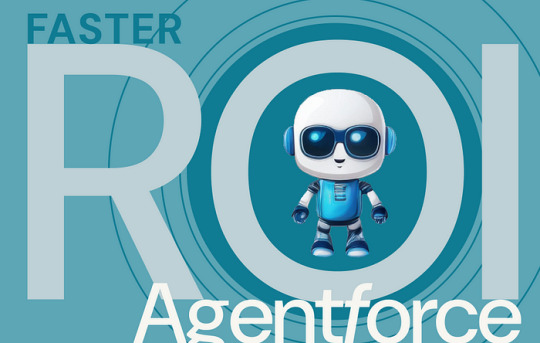
Understanding ROI in the Context of Agentforce
Return on investment with Agentforce isn’t limited to cost reduction. While automation often leads to savings in time and labor, ROI also includes improvements in customer satisfaction, faster resolution times, enhanced decision-making, and increased sales conversions. A comprehensive ROI assessment involves both quantitative and qualitative measures.
Also Read this blog- Salesforce AI Strategy Unveiled: The Power of Agentforce and Beyond
Key Metrics and KPIs to Monitor
Customer Satisfaction (CSAT)
Track CSAT scores to evaluate how customers perceive interactions with AI agents. Improved satisfaction often correlates with quicker, more accurate resolutions and consistent service quality.
2. First Contact Resolution (FCR)
Measure how often customer issues are resolved during the first interaction. High FCR rates signal the efficiency and effectiveness of Agentforce-powered interactions.
3. Average Handling Time (AHT)
Monitor how long it takes to complete tasks or resolve issues. A decrease in AHT typically reflects well-optimized workflows and effective use of AI assistance.
4. Agent Utilization Rate
Evaluate how much of the workload is being handled by Agentforce versus human agents. A balanced utilization can help optimize resources and reduce operational costs.
5. Lead Conversion Rate
For sales teams, measure the percentage of leads converted into customers with the help of Agentforce. Intelligent automation can speed up response times and qualify leads more effectively.
6. Operational Cost Savings
Calculate savings derived from reduced manual labor, fewer escalations, and improved efficiency. This directly reflects the cost-effectiveness of deploying Agentforce.
7. Time to Resolution
Track the average time taken to resolve issues. A lower time to resolution generally leads to happier customers and better retention.
8. Escalation Rate
Keep an eye on how often issues are passed on from AI to human agents. Lower escalation rates may indicate the increasing capability and reliability of Agentforce agents.
Enhancing ROI Through Best Practices
Continuous Training and Optimization: Regularly update AI models with new data and feedback to improve performance and relevance.
Hybrid Workforce Strategy: Combine the strengths of AI agents with human expertise to deliver superior service.
Performance Dashboards: Use real-time dashboards to monitor KPIs and make data-driven decisions.
Customer Feedback Integration: Leverage feedback to fine-tune agent behavior and workflows.
Conclusion
Agentforce presents a powerful opportunity to drive operational excellence and elevate customer engagement through AI. By identifying and tracking the right metrics, organizations can not only justify their investment but also continuously refine their strategies to get the most out of this cutting-edge technology. In the age of intelligent automation, success is measured not just by what you implement, but by how well you measure and improve it.
0 notes
Text
How to Scale Your Business Without Wasting Time or Money

Scaling a business isn’t just about growth — it’s about strategic, sustainable, and cost-effective growth. As companies navigate through complex market dynamics, the challenge lies in expanding operations while optimizing both time and financial resources. Below, we present a comprehensive guide to scaling your business efficiently without unnecessary delays or expenditures.
Establish Clear, Scalable Systems from the Start
The first step in scaling without waste is building streamlined systems. Without scalable infrastructure, growth creates chaos rather than results.
Key strategies:
Automate repetitive tasks with tools like Zapier, Asana, and HubSpot to minimize manual work.
Standardize workflows using SOPs (Standard Operating Procedures) for customer service, onboarding, inventory management, and marketing.
Implement cloud-based platforms like Google Workspace, Slack, and Trello for team collaboration that can grow with your company.
Hire Smarter, Not Bigger
Expanding your team should be strategic, not excessive. Every new hire should bring tangible ROI.
Optimize your hiring process:
Prioritize multi-skilled professionals over specialists to cover more ground.
Use freelancers or virtual assistants for non-core tasks like data entry, customer follow-ups, or social media scheduling.
Leverage outsourcing partners for services like payroll, IT support, or HR.
This approach reduces overhead and maintains operational agility.
Use Data-Driven Decision Making
Scaling without wasting money begins with tracking every dollar and analyzing performance metrics relentlessly.
Key areas to monitor:
Customer acquisition cost (CAC) and lifetime value (LTV) to assess marketing effectiveness.
Conversion rates, churn, and upsell opportunities within your sales funnel.
Return on Ad Spend (ROAS) to fine-tune digital advertising.
Tools like Google Analytics, Hotjar, and SEMrush can help you identify bottlenecks and uncover hidden growth opportunities.
Leverage the Power of Lean Marketing
Gone are the days of bloated ad budgets. Today’s successful companies focus on lean, high-ROI marketing tactics.
Top lean marketing strategies:
Focus on organic SEO through high-quality content, keyword research, and backlink building.
Build an email marketing funnel to nurture and convert leads with tools like Mailchimp or ConvertKit.
Maximize visibility through social proof — testimonials, case studies, influencer shout-outs, and user-generated content.
These tactics generate long-term brand equity without constant spending.
Double Down on Core Offerings Before Expanding
Too many businesses waste money by diversifying too early. Focus on what you do best, and dominate your niche before expanding.
Steps to refining your core offerings:
Conduct customer feedback loops to improve your most popular products or services.
Create bundles or tiered pricing to increase average transaction value.
Use cross-selling and upselling strategies that increase revenue without increasing customer acquisition cost.
Scaling is smoother when your core business is profitable, repeatable, and optimized.
Adopt Scalable Technology Solutions
The right technology is your best ally in reducing costs and saving time as you grow.
Key tech tools for scaling efficiently:
CRM platforms like Salesforce or Zoho for managing customer relationships.
ERP software like NetSuite or Odoo for real-time business operations control.
Accounting platforms like QuickBooks or Xero for automating invoicing, payroll, and expense tracking.
Cloud-based, subscription-model software ensures you only pay for what you use, and can scale up as needed.
Focus on Customer Retention Over Acquisition
Customer acquisition is expensive. It’s far more cost-effective to retain and upsell existing customers.
Retention-focused strategies:
Implement loyalty programs to reward repeat business.
Personalize communication using behavioral data and past purchase history.
Offer exceptional customer support to reduce churn and build brand advocates.
The longer a customer stays, the greater their lifetime value — which means more growth, with less marketing cost.
Bootstrap Intelligently When Possible
Bootstrapping isn’t about pinching pennies — it’s about prioritizing investments.
Best bootstrapping practices:
Reinvest revenue into high-yield activities, such as product development and content marketing.
Negotiate with vendors and service providers for long-term deals or performance-based pricing.
Delay fixed overhead expenses like office leases and full-time hires until absolutely necessary.
Being frugal at the right moments creates financial flexibility when it counts.
Use Strategic Partnerships to Accelerate Growth
Collaborations can provide instant scale without the financial strain of building from scratch.
Types of valuable partnerships:
Affiliate programs that reward others to sell for you.
Co-marketing campaigns with complementary businesses to reach broader audiences.
Wholesale or distribution alliances that put your product in more hands without increasing internal logistics.
These partnerships reduce the need for heavy capital investment in growth.
Maintain a Growth-Ready Mindset
Scaling isn’t just about operations — it’s about culture.
Key mindset shifts:
Embrace continuous learning and encourage your team to do the same.
Set aggressive but realistic KPIs, and celebrate incremental wins.
Foster a fail-fast attitude, where experimentation is encouraged and learning is fast.
Culture plays a critical role in sustaining momentum during periods of rapid growth.
Conclusion: Growth Without Waste Is Possible
Scaling your business doesn’t require breaking the bank or burning out your team. With the right systems, strategy, and mindset, you can achieve rapid, efficient, and sustainable growth. Focus on lean processes, data-driven marketing, customer loyalty, and technology-powered scalability. These elements are the foundation of any business that wants to grow smartly, not just quickly.
0 notes
Text
Salesforce Certified Marketing Cloud Consultant Certification in New York

In today’s competitive business landscape, marketing professionals are increasingly turning to advanced tools like Salesforce Marketing Cloud to improve customer engagement and drive business growth. For those looking to take their marketing skills to the next level, obtaining the Salesforce Certified Marketing Cloud Consultant certification is a powerful way to validate expertise. In New York, a bustling hub of business, technology, and innovation, this certification is particularly valuable. This article will explore everything you need to know about obtaining the Salesforce Certified Marketing Cloud Consultant Certification in New York, including the benefits, preparation tips, and job opportunities that await successful candidates.
What is Salesforce Marketing Cloud?
Salesforce Marketing Cloud is a leading digital marketing platform that allows businesses to manage customer engagement across multiple channels such as email, social media, mobile apps, and the web. The platform is highly customizable and designed to help organizations deliver personalized customer experiences through data-driven marketing automation.
As a Salesforce Marketing Cloud Consultant, professionals are expected to understand the platform’s capabilities, implement effective solutions for clients, and ensure seamless integration with other Salesforce products. The certification exam validates a candidate’s ability to configure Marketing Cloud applications, create efficient workflows, and optimize marketing campaigns for maximum effectiveness.
Why Pursue the Salesforce Certified Marketing Cloud Consultant Certification in New York?
1. Thriving Job Market
New York is one of the largest economic hubs in the world, home to numerous Fortune 500 companies, startups, and digital marketing agencies. These organizations are constantly seeking professionals who can help them harness the full potential of Salesforce Marketing Cloud. By obtaining this certification, individuals position themselves as highly desirable candidates for these organizations, with potential roles such as marketing consultant, digital marketing strategist, and Salesforce specialist.
2. Competitive Advantage
In a city like New York, where the competition for marketing jobs is fierce, having the Salesforce Certified Marketing Cloud Consultant certification sets you apart from other professionals. This certification demonstrates a high level of technical proficiency and hands-on experience, ensuring that you stand out to potential employers and clients.
3. Lucrative Salary Opportunities
Professionals with Salesforce certifications generally command higher salaries than their non-certified counterparts. In New York, where salaries are already higher due to the cost of living, Salesforce Certified Marketing Cloud Consultants can expect lucrative salary packages. According to industry reports, certified consultants can earn an average salary ranging from $100,000 to $150,000 per year, depending on their experience level and the organization they work for.
4. Networking Opportunities
New York offers numerous opportunities to network with professionals in the Salesforce ecosystem. With frequent industry events, workshops, and user groups dedicated to Salesforce Marketing Cloud, aspiring consultants can build valuable connections that may lead to job opportunities or partnerships.
Preparing for the Salesforce Certified Marketing Cloud Consultant Certification in New York
1. Understand the Exam Structure
The Salesforce Certified Marketing Cloud Consultant exam consists of 60 multiple-choice or multiple-select questions, and candidates have 105 minutes to complete it. To pass, candidates must score at least 67%. The exam tests a candidate’s knowledge in five key areas:
Discovery and Assessment: Understanding the client’s marketing needs and goals.
Integration: Integrating Marketing Cloud with other Salesforce products and third-party applications.
Account Configuration: Setting up and managing Marketing Cloud accounts.
Automation and Campaign Configuration: Creating and automating marketing campaigns.
Reporting and Analytics: Monitoring campaign performance and making data-driven decisions.
2. Leverage Online and In-Person Training Programs
In New York, professionals can choose from a variety of training options to prepare for the certification exam. Salesforce offers official training courses that cover Marketing Cloud features in detail. Additionally, many New York-based training providers offer in-person workshops and boot camps designed specifically for the Salesforce Certified Marketing Cloud Consultant exam.
Some of the most popular training programs include:
Salesforce University: Salesforce offers both instructor-led and self-paced training options, which are a great way to dive deep into the Marketing Cloud platform.
Local Salesforce User Groups: Joining Salesforce user groups in New York allows candidates to participate in discussions, attend meetups, and learn from experienced Salesforce professionals.
Third-Party Online Courses: Platforms like Udemy, Trailhead, and LinkedIn Learning offer courses designed to help candidates prepare for the exam at their own pace.
3. Hands-On Experience
While theoretical knowledge is crucial, hands-on experience with Salesforce Marketing Cloud is essential for passing the exam and excelling as a consultant. Consider working on real-world projects, either through your current job or by offering freelance services, to gain practical experience with the platform. This not only helps you understand the platform better but also enhances your problem-solving skills.
4. Practice Exams
One of the best ways to prepare for the Salesforce Certified Marketing Cloud Consultant exam is by taking practice tests. Several websites and training platforms offer practice exams that simulate the actual test environment. This helps candidates become familiar with the question format, time management, and areas where they may need further study.
Career Opportunities After Earning Salesforce Certified Marketing Cloud Consultant Certification in New York
1. Consulting Firms
Many consulting firms in New York specialize in implementing Salesforce products for their clients. With your Salesforce Certified Marketing Cloud Consultant certification, you could work for top consulting firms such as Deloitte, Accenture, or PwC, helping businesses optimize their marketing efforts.
2. Digital Marketing Agencies
New York is home to numerous digital marketing agencies that work with companies across various industries. These agencies are always on the lookout for certified professionals who can create, manage, and analyze marketing campaigns using Salesforce Marketing Cloud. Your certification will open doors to roles such as Marketing Automation Specialist or Digital Marketing Consultant.
3. In-House Marketing Teams
Large companies with in-house marketing teams are increasingly adopting Salesforce Marketing Cloud to manage their marketing operations. Companies in industries such as finance, retail, and media frequently hire Salesforce Marketing Cloud consultants to enhance their marketing strategies and ensure seamless customer experiences. In New York, companies like American Express, NBCUniversal, and JPMorgan Chase are known for their reliance on Salesforce products.
4. Freelancing and Contract Work
If you prefer to work independently, the Salesforce Certified Marketing Cloud Consultant certification can help you secure freelance or contract opportunities. New York’s thriving freelance market offers a wide range of opportunities for consultants who specialize in Salesforce Marketing Cloud. Freelancers often work with multiple clients, providing flexibility and the potential for high earnings.
Conclusion
Obtaining the Salesforce Certified Marketing Cloud Consultant Certification in New York is an excellent investment in your career as a marketing professional. The certification provides a competitive edge in the thriving New York job market, offering opportunities in consulting firms, digital marketing agencies, and large in-house marketing teams. By earning this certification, you can unlock lucrative salary packages, gain valuable hands-on experience, and tap into a strong network of Salesforce professionals in the city.
#Salesforce Marketing Cloud Training NYC#Salesforce Certified Marketing Cloud Consultant#certification course#Salesforce Certified Marketing Cloud Consultant Certification in New York
0 notes
Text
During a market slump, here’s what the board should do.

The first COVID-19. Then come health requirements. The conflict between Russia and Ukraine, constricted supply chains, increased costs, interest rates, and inflation should also be considered. As a recession is predicted to be unavoidable, economists are beginning to agree.
No one has a crystal ball, and the future looks more unpredictable than ever, but if we break these issues down (such as pandemics, conflict, and increasing food and fuel costs causing a recession), we realise that many of us have faced such difficulties in the past. Either we survived and prospered, or we made errors and learned what not to do. For navigating this next period of uncertainty, these thoughts are quite helpful.
One person's perspective on a problem may only be so broad, especially for entrepreneurs. It may be challenging to think creatively when there is limited prior experience to draw from, especially for new leaders. However, that's where a board can come in and help with better-informed decision-making, thanks to the knowledge of its members. To better address problems and seize opportunities, leaders may draw on the wide breadth of knowledge that their board members possess — their "been there, done that’s" — to help their organisation navigate through even the most trying circumstances, such as the impending recession.
Utilize your knowledge
With an average of 17 months of contraction followed by 38 months of growth, the United States has seen 32 economic cycles since 1854. Recessions have occurred four times since 1980 during these times of deflation. No two recessions are the same due to the passage of time, but there will probably be some commonalities in the procedures needed to overcome them. Having members of your board who experienced the worst of all of these in 2008 may help you identify circumstances that are comparable and might benefit from similar solutions, as well as instances in which unanticipated developments may need unanticipated action.
In order to get through the next difficult times, CEOs should make the most of all the board members' contributions. After all, a board's responsibility is to steer a firm toward its objectives. A company's prospects of surviving the recession increase with the expertise of its board of directors. With the help of a knowledgeable board, even newly appointed CEOs may prepare for probable traps and steer clear of impending problems. Leaders may make better, more informed choices with a lower chance of failure by incorporating the lessons learnt from prior mistakes and triumphs and then analysing them via the varied viewpoints on your board.
Everyone benefits from transparency in their job.
One of the most important factors in success is open communication between the organisation, its board of directors, and all stakeholders. The epidemic has made openness more important than ever, according to Salesforce President and CFO Amy Weaver. "All of a sudden, you were compelled to make judgments at lightning speed, ones that may actually alter the whole course of your organisation." Weaver thinks that the solution to finding a balance is to communicate more with the board.
No one is aided by false information, particularly those who intended to utilise it to direct a business. If they sense the company's leadership is concealing anything, board members find it difficult to trust them or feel they share their values. Their experience may assist us in converting our thoughts into workable plans of action if we bring all of our ideas to the table in an open and honest manner.
Develop and implement a clear vision.
A long-term development strategy for your business may serve as your compass during unpredictable times by keeping it going in the correct way. According to recent FMI research of 150 firms, executives who took snap judgments that were at odds with their organisations' long-term goals suffered negative short- and long-term effects. Some people have discovered the advantages of relying more on their board to question choices by drawing on the knowledge and perspectives of their board members. When the waves are threatening to sweep everyone under, a clear vision acts as a "lighthouse in a storm," keeping everyone in the group focused on reaching the land.
Everyone engaged is more prepared to succeed if you establish clear objectives and order the construction of a board according to the height of those goals. Make a vision immediately if your business doesn't already have one. If you already have a vision, it can be a good idea to review it to make sure it jives with your goal and key principles. Your board members may provide you guidance on how to maintain that path after everyone has come together around a clear vision that outlines the issues a firm address, how it addresses those issues, where it wants to go, and what that will look like.
Spend your money more wisely.
A board of directors may assist in analysing the vision to make sure that investments made by the firm are working toward that goal. Investments are necessary for a company to grow. When Universal Investments CEO Mary Cantrell asked the board of directors to determine whether to restrict or shut a diamond-mining investment fund, the board ultimately decided to increase the fund's charter, which beat the majority of benchmark indices. A better corporate choice was made as a consequence of the board members' analysis and insight than the management would have been able to come to on its own given its knowledge and expertise.
Boards can provide greater guidance on saving, budgeting, and planning to successfully navigate challenging economic times and thrive. Let them see your finances and where the business is so they can know where you are financially and where the firm is headed. When financial pressure increases, take the advice of the board to make more deliberate recruiting and firing choices rather than hurriedly laying off employees. Reconsider long-standing connections with suppliers using the knowledge of the board. Your board can aid you in brainstorming fresh methods to go on cooperating in ways that still benefit everyone in the face of difficulties.
Even if there may be a recession on the horizon, the good news is that we have already survived one. A beginning and an end may be spoken about difficult times. When everything is said and done, your company can succeed if you have a board ready to lead you and its wealth of expertise and knowledge through the obstacles ahead.
About the Founder and CEO at Convanto:
Vandana Tolani started her journey by heading a family office in Singapore and Jakarta, where she worked as an investment banker & advisor to family offices and angel investors. She helped start-ups from diverse backgrounds, from fin-tech and B2B tech to consumer startups. After 15 years in Singapore and Jakarta, she returned to India. She did investments for a while and then returned to the advisory. That is when Convanto was founded. Today, Convanto is one of the most well-known boutique investment banks in India, led by a female founder. Convanto has a core portfolio of over 210 investments in more than 45 countries. Vandana Tolani has a personality full of zest, passion, and ardor towards her field of expertise, with more than 25 years of experience in international and domestic business advisory and fundraising.
Vandana Tolani is often considered one of the most prominent personalities in her field and is often asked to share her knowledge and expertise as the chief speaker in many webinars and seminars. Till date, she has participated in 350+ talks, which you can view on YouTube and on our website: https://linktr.ee/convanto.
Her story is nothing short of inspirational, and she is the recipient of numerous awards, including the following: Top 10 Women Leaders in Wealth Management.
Women Entrepreneur of the Year for 2021 and 2023.
Global Woman Leader, awarded by the World Women Congress.
Best Financial Institution in Supporting Start-Ups in India, awarded by Dr. Kiran Bedi.
Pioneering Women Leaders in Investment Banking, awarded by Hema Malini. Her achievements and contributions have been featured in prominent publications such as the Times of India, Hindustan Times, and Gurgaon Times. Her story was recently covered in Volume 2 of Eves Against the Odds, a book about 25 inspiring women entrepreneurs.
She can be reached at:
https://www.linkedin.com/in/vandanatolani/
https://www.instagram.com/convanto_/
0 notes
Text
"New Study Reveals Surprising 75% Increase in Sales with Atrium's Data Analytics Services. Learn More Now!"
New Polarizing Numerical Facts - RoamNook
New Polarizing Numerical Facts
Welcome to RoamNook's blog, where we bring you groundbreaking factual information, supported by concrete data and numbers. Our goal is to provide you with informative content that sheds light on important topics and brings new information to the table. In this article, we will discuss various subjects, incorporating technical, professional, and scientific terms to provide practical and real-world applications of the information presented.
Subject 1: The Power of Artificial Intelligence
Artificial Intelligence (AI) has revolutionized various industries and continues to drive innovation forward. Did you know that AI-powered chatbots can handle up to 80% of customer inquiries without human intervention? This automation not only saves time but also reduces costs for businesses.
Furthermore, AI-driven predictive analytics can analyze vast amounts of data to predict customer behavior, enabling companies to personalize their marketing strategies and increase customer satisfaction. Studies have shown that organizations that invest in AI experience a 10% increase in productivity on average.
Subject 2: The Rise of Big Data
The amount of data generated worldwide is growing exponentially. According to recent statistics, approximately 2.5 quintillion bytes of data are created every day. This data comes from various sources, such as social media, healthcare records, and IoT devices.
With the rise of big data, companies can leverage this information to gain actionable insights and improve decision-making. For example, retailers can analyze customer purchase patterns to optimize inventory management and personalize marketing campaigns. It's estimated that big data analytics can help organizations achieve a 60% increase in profit margins.
Subject 3: The Impact of Cloud Computing
Cloud computing has transformed the IT landscape, providing scalable and cost-effective solutions for businesses of all sizes. Did you know that 94% of enterprises already use a cloud service? This adoption is driven by the numerous benefits offered by cloud computing, including flexibility, enhanced collaboration, and reduced infrastructure costs.
Cloud platforms, such as Salesforce and Tableau, enable organizations to streamline their operations and quickly access critical business data from anywhere in the world. The cloud market is projected to reach $623.3 billion by 2023, indicating the continued growth and importance of cloud computing.
Subject 4: The Importance of Data Security
In today's digital age, data security is a paramount concern for individuals and organizations alike. Cyberattacks and data breaches can have severe consequences, including financial losses and reputational damage. On average, a data breach costs a company $3.86 million.
Implementing robust cybersecurity measures, such as encryption and multi-factor authentication, is crucial to protect sensitive information. As technology advances, so do the tactics of cybercriminals. Companies must remain vigilant and continuously update their security protocols to stay one step ahead.
Subject 5: The Role of Data Science in Decision-Making
Data science plays a crucial role in today's data-driven world. By analyzing complex datasets and extracting meaningful insights, data scientists help organizations make informed decisions and drive business growth. In fact, companies that utilize data-driven decision-making are 6% more profitable.
Data science encompasses various techniques, including machine learning, statistical analysis, and predictive modeling. These methodologies enable companies to uncover patterns, detect anomalies, and identify trends that would otherwise go unnoticed. By leveraging data science, businesses can optimize their operations, increase efficiency, and gain a competitive edge.
Conclusion: RoamNook - Fueling Digital Growth
In conclusion, the world of technology and data continues to evolve at a rapid pace. To stay ahead of the curve, businesses need to embrace innovation, leverage technology, and harness the power of data. This is where RoamNook comes in.
RoamNook is an innovative technology company specializing in IT consultation, custom software development, and digital marketing. Our expertise and cutting-edge solutions can help businesses navigate the ever-changing digital landscape and fuel their growth.
Whether you need assistance with Salesforce implementation, Tableau data visualization, or Snowflake data engineering, RoamNook has the knowledge and experience to deliver exceptional results. Our team of experts is committed to providing tailored solutions that align with your unique business needs.
Don't miss out on the opportunity to thrive in the digital era. Contact RoamNook today [https://www.roamnook.com] to explore how we can support your digital transformation journey and unlock your business's full potential.
Source: https://atrium.ai/resources/the-power-of-predictive-sales-forecasting-for-revenue-operations-teams/&sa=U&ved=2ahUKEwi7q8au1ZSFAxUUD1kFHfoADWQQxfQBegQIBhAC&usg=AOvVaw3EA5hji0gIqFWmP5jw69oy
0 notes
Text
What are the barriers to TOD in America, and how can cities overcome this issue? Support your view with a successful example of TOD (in or outside the U.S.)

We think the obstacle to TOD in the U.S. is that the whole process of implementation is subject to legitimacy challenges.
The implementation of TOD in the capital markets is often predicated on land appreciation, and due to the large upfront investment, it must be guaranteed that land prices in the area will rise in order to operate. But there are huge risks involved, and most of these risks are borne by the city, not the developer. In order to promote a TOD strategy, the city usually has to provide upfront infrastructure funding, project management and community engagement services. As the founder of TOD, Peter Calthorpe reminds us that "affordable housing must start with affordable neighborhoods." Increasing the supply of affordable housing and providing more jobs must be urged by the government to accomplish this. And it is impossible to do so by relying on the capital markets, which tend to create eye-catching hedonistic environments that employ glamorous, highly educated elites.
Addressing this obstacle depends in large part on the ability of cities to develop appropriate housing strategies to make government affordable.
TOD does not work in isolation; it and affordable housing strategies accomplish each other. As people use public transportation more, the less they spend on transportation, which increases the overall affordability of the community. Extremely low-income households will move farther into the suburbs because they can't afford to pay downtown rents, spending even more than 50 percent of their household income on transportation to do so. While moving to the suburbs reduces the cost of housing, the additional cost of transportation makes it difficult for poor families to survive. Housing compensation in the form of affordable housing could therefore be provided for low-income residents displaced by regional development. Provide affordable housing for low income households within a half-mile radius around each transit hub. This is because the preservation of older homes and the development of affordable housing around transit stations is consistent with the State's macro-strategy of continued support for affordable housing.

The San Francisco Bay Rim project is a success story.
In executing the planning for the TOD project, the management recognized at the outset of the project that public interest and private enterprise complement each other ---- The private economic growth driven by public transportation will be used in part to pay for the cost of public transportation, and the public-private partnership needs to continue throughout the project. The Transbay redevelopment not only plans for residential land to match the office space, but also provides affordable housing at 35% for low-income people. The first project completed in the Transbay Redevelopment Area, Rene Cazenave Apartments, was developed by two local non-profit organizations. The eight-story building consists of 120 apartments with condominiums for the homeless, supportive services, and ground-floor retail space.

With the opening of the Salesforce Passenger Center, the redevelopment of the Bay Rim area opens up a new urban revitalization scenario: one that is transit-oriented and provides a high level of public amenities and a diversity of employment opportunities in a mixed-income community. The development is expected to increase the value of properties within 1.2 kilometers of the Salesforce Terminal by an average of 5%, with an estimated 11% increase in the value of properties directly adjacent to the Terminal.

Currently, the implementation of the TOD project not only pushes the construction of the surrounding land, but also attracts high-tech research and development industries to the city center with the perfect transportation system and new public facilities.

0 notes
Text
Trust Greytrix for end-to-end expert Salesforce Consulting Services!
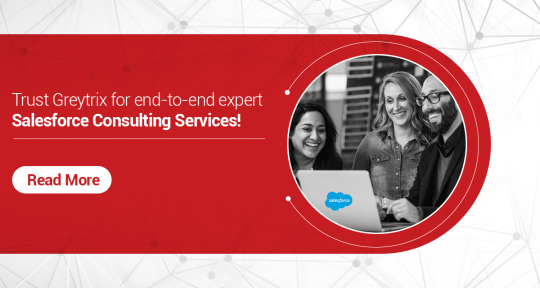
Salesforce is the leading CRM solution worldwide, empowering businesses to exceed customer expectations and enhance their sales, service, and marketing efforts. This cutting-edge cloud-based software is revolutionizing how businesses interact with customers.
Whether you want to tailor Salesforce to meet your business-specific needs or improve your current CRM approach, Greytrix is the best bet for all your Salesforce requirements. As a certified Salesforce Implementation & Consulting Expert, we implement & optimize your business workflows and rules in your Salesforce org. We make sure we’re with you throughout your CRM journey with a well-thought CRM strategy, Salesforce best practices, and methodologies.
Our end-to-end Salesforce consulting services enhance your lead conversion rate, customer experience, and opportunity management. With our Salesforce expertise and unique approach, we help you to unlock most Salesforce Products, starting from Salesforce Service Cloud, Salesforce Marketing Cloud, Salesforce Pardot, and more. As a Salesforce Partner, we help mitigate risk, maximize your investment, and ensure the project’s success.
Moreover, to help you implement Salesforce Products as desired, we go the extra mile to enhance your functionalities by implementing third-party apps like Marketo to automate your marketing activities and Workato to optimize integration experience with seamless data management. Whether you’re looking to implement Hubspot to effectively attract, engage, and convert leads or Ring Central to enhance communication capabilities, we’re here to guide you in maximizing the power of your Salesforce.
If you’re already using Salesforce CRM, we assist you in adopting best practices aligned with industry trends, thereby helping you achieve a better return on investment through valuable consultations.
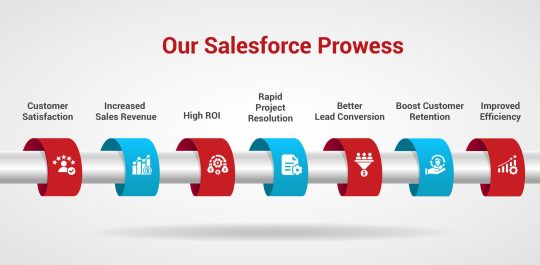
Customer Satisfaction
High ROI
Better Lead Conversion
Improved Efficiency
Increased Sales Revenue
Rapid Project Resolution
Boost Customer Retention
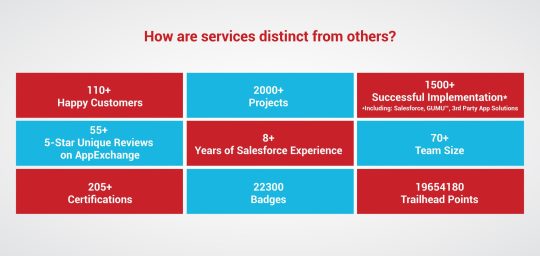
Our Implementation Approach
Experience enhanced operational efficiency with our support! We thoroughly assess your business readiness, ensuring a stress-free and seamless experience. By finely tuning your business operations and introducing efficient workflow automation, we’ll unlock new levels of productivity.
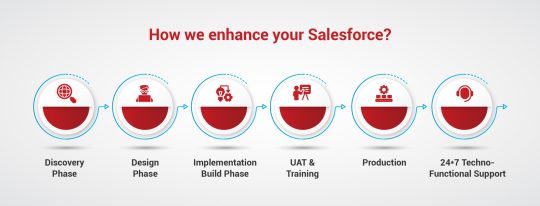
Average Deployment Time: 60-120 Days
Salesforce Suite of Products
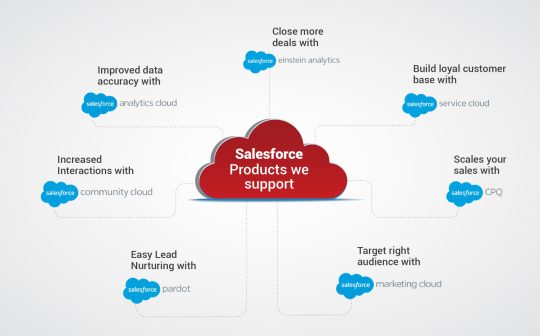
Let’s have quick glimpse at our Salesforce Services
Our Unbeatable Salesforce Services
At Greytrix, the path from idea to implementation is hassle-free as our robust Salesforce Services allow us to build a customized solution that best aligns to your business goals. Accelerate your success journey today with our end-to-end Salesforce services (Implementation, Platform Consulting, Customization, Integration, Migration, and Support.)
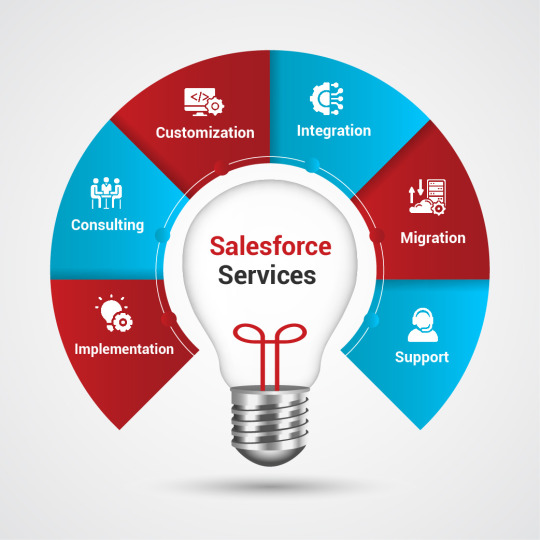
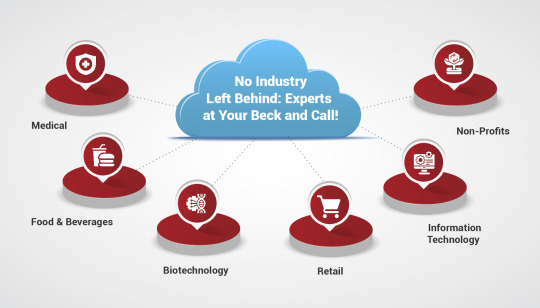
We go beyond delivering Salesforce Implementation with our Salesforce AMS
We treat your business as our own and take pride in resolving all your challenges. As a long-term Salesforce Implementation Expert & Consulting Partner, we offer in-moment query resolution, expert guidance, and on-demand training sessions to ensure fine-tuned implementation. We guide towards excellence with Salesforce AMS by providing complete ongoing support through 24/7 Support services, Communication Channels, and, Scope strategies
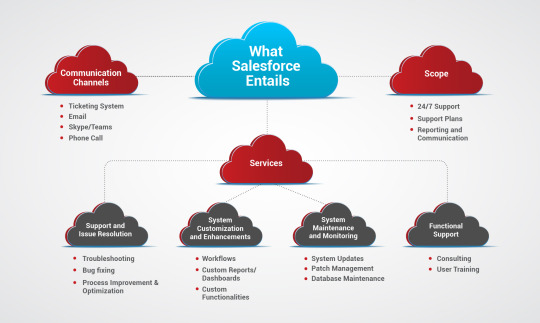
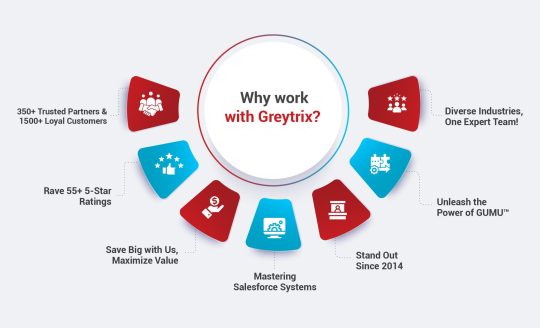
350+ Trusted Partners & 1500+ Loyal Customers: Unlock Seamless ERP Integrations with CRM & More.
55+ 5-Star Ratings: Learn why our customers keep coming back and ask more for Salesforce – Sage ERP Integration.
Save Big with Us, Maximize Value: Get Tailored, cost-effective integration with exceptional ROI—a perfect match for businesses.
Mastering Salesforce Systems: Harness our 8+ years of Salesforce experience and expertise.
Abundant Experience Since 2014: Listed with pride on Force.com, AppExchange & Salesforce Implementation.
Unleash the Power of GUMU™! Trust our Champion Integrator – GUMU™, for secure data transfer.
Diverse Industries, One Expert Team! Unlock wide-ranging industry expertise and custom-built solutions for every industry.
Are you looking for Salesforce Implementation Expert or Salesforce Consulting Partner? We’ve got you covered! We value your business and want to ensure your success. Our expert team is here to provide the perfect Salesforce implementation for your booming business.
Reach out to us today at [email protected] or call us at 1 888 221 6661 to explore our services and boost your business together! Don’t wait, Act now!
Originally Posted by https://www.greytrix.com/ on 17-08-2023
0 notes
Text
Best Game Development Company in Hyderabad | ColourMoon Technologies
The Indian Gaming industry is huge with a market of 7500 crores as per 2019 analysis and is expected to grow further to 11800 crores by 2023. If you are planning to create a Gaming App to monetize and publish the next big success in the gaming world, you are in the right place.

Gaming companies develop different types of games for various platforms and provide services such as programming, designing, conceptualization, dubbing services, debugging, testers, etc. However, what sets a great gaming company apart from an average one, is the experience and skillset of its development team.
Once you hire an expert Game Development Company in Hyderabad, you can start to focus on other core activities that really matter to your company, such as marketing, sales, launch events, etc. Hyderabad is one of the largest hubs for software and game development with some of the most creative and proficient minds in the IT world. Gaming companies in Hyderabad have made exceptional contributions to the gaming markets in the world, making huge profits for their customers.

Since they are hundreds of game development companies in Hyderabad, choosing the right one creates challenges and confusion for you. Listed here is the best gaming firm that not only offers value for your money but also builds games that provide the ultimate user experience and rake in profits for you.
Top gaming company in Hyderabad
The Colour Moon Technologies: Having multiple locations in Telangana and Andhra Pradesh, colourmoon is a top-notch software and games development company with a large team of expert software engineers and developers. Their highly professional and creative team of coders provide the best gaming solutions through their specialized in-house programming structure.
• Headquarters: Vishakhapatnam • Other Locations: Vijayawada and Hyderabad • Founded: 2008 • CEO: Mr. B.Subramanyam
Why makes the Colour Moon Technologies the Top Game Development Company in Hyderabad?
With 11+ years in the software industry and more than 2000 projects in its impressive portfolio, colourmoon is a seasoned company that provides end to end solutions to their clients. Some of their achievements include:
800+ committed and devoted clientele. The list includes industry giants such as Amazon Web Services, Micr0soft, Salesforce, HubSpot, Intel, etc.
2000+ successfully deployed projects throughout the globe.
Some of the most successful game publishers on the Google and Apple Play stores.
Ranked No.1 Software and Mobile App development company in India on different platforms.
End to End solutions provider for all types and platforms of games.

Specialized Category of Games:
Multiplayer Shooter Games
Skilled based Games
Location-Based Games
Board Games
Puzzle Games
Sports Games
Racing Games
Card Games
Expertise in Gaming Platforms:
Android (Google)
IOS (Apple)
PC (Microsoft Windows)
HTML5
Flash
Java
Unity 2d/3d
Top features of a Great Game Development Company
1. Experience and highly skilled Staff: To build a great game for yourself, the most important factor is to have a talented and reliable team of game developers. Game engines require more complicated and complex sets of code that can only be done by skilled personals who have in-depth knowledge about the end-to-end development of a game. While other software requires simple coding and design preferences, games need to have enhanced graphics, advanced logic codes, added security, addictive user experience, upgrading compatibility, etc.
2. Streamlined Methodology: Most gaming companies are unaware of the different methodologies required to create a successful game. Developing software and games have similarities up to a certain level and the technical approach varies from product to product. Let us discuss the various methodologies used to develop games.
3. Waterfall Model: The waterfall model is an age-old technique of building and deploying software and games quickly into the market. This works well for customers who have a fixed budget and want to build small games that do not require constant updates and maintenance. The process includes the following steps.
4. Best Utilization: Less Complex Games which do not require constant updates.
WaterFall Model Process:
Gather game idea and document requirements from customers
Start Design
Create live Prototypes
Core Architecture Design
Code and unit test (Development phase)
Perform system testing
Perform user acceptance testing (UAT)
Fix any issues in the App
Deliver the finished Gaming App
WaterFall Model Games list:
• Board Games • Ludo • Tombola • Chess • Pong • Kids games
Agile Methodology: In the current game development model, the Agile methodology is the most preferred process to build games and complex software. The Agile model has also been in the market for a very long time, however, due to the added costs for specialized skillset, it was only used by large corporations
Fortunately, game developers now are very well versed with the process and currently, the process is more affordable and reliable. The model works best for more complex games that require constant updates, maintenance, and maximum user experience.
Best Utilization: Complex Games that require constant updates and are never-ending. These games make a lot more money for their owners and companies.

Agile Methodology Process:
• Gather game idea and document requirements from the customer • Plan the game • Requirement Analysis of the game • Designing as per documentation and compatibility • Create live Prototypes • Core Architecture Design • Code and unit test (Development phase) • Perform system testing • Check for Upgradability • Performing user acceptance testing (UAT) • Fix any issues • Check for Upgradability again • Perform user Acceptance Testing again. • Check for any issues again • Deliver the finished Gaming App
Agile Model Games list:
• Multiplayer Shooter Games • Skilled based Games • Location-Based Games • Puzzle Games • Sports Games • Racing Games • Card Games • Rummy • Teen Patti • End to End Game Development:
As mentioned earlier game development requires a more complex structure of codes and cannot be outsourced in parts to different companies. A game building company should have all the required tools and staff to create it from start to finish. Multiple elements such as storyline, graphics, controls, structural coding, support, maintenance, upgrades, etc, - all come into play to make a successful and profit-making game.
Why choose colourmoon for Game Development in Hyderabad?
Recipients to multiple awards in the gaming industry and with technical experience that spans for more than a decade, thecolourmoon has constantly delivered some of the best games and software products to their customers. Our end to end solutions provide you with unique and superior services that will transform your imagination into an amazing and profit-generating Game App.
We have some of the best tools, resources, methodologies, latest technologies that have been perfected over the years. These include 2d and 3d games that can be played on multiple platforms and earn you revenues from multiple sources.
Talk to our experts if you had a game idea to implement. We develop games from conceptualization till end product, Get end to end game design and Game development services from Colourmoon Technologies
#Game development companies#mobile game development company#mobile game development agency#game developer companies near me#game app development company#game design companies#gaming companies near me#no 1 gaming company#indian game developers company#best game development#indian game making companies#mobile game app development company#game app companies#largest online gaming companies#online game development companies#largest mobile gaming companies#independent game companies#best game design companies#game dev companies#indian game development companies#best game developer companies#game design companies near me
1 note
·
View note
Text
The Key to Bringing Better Customer Experience to Healthcare is Salesforce CRM

Consumerism has joined the healthcare vernacular over the last decade. Despite this, many healthcare majors have grappled to realize its value because they lacked knowledge of how to integrate it into their existing business models or how to build and apply metrics to gauge the success of their consumerism initiatives.
As a leader in digital transformation for healthcare, ACI Infotech can provide you a comprehensive perspective on healthcare consumerism strategies. We can help you identify interests, drive positive outcomes, and provide a Salesforce implementation roadmap for all your systems.
Seeing patient care beyond a business
Like many other industries, healthcare has to evolve to meet the ever-growing demands of the digital age. The healthcare systems today are required to produce on-demand services starting from providing tools tracking patient data to developing applications that streamline office visits and test reports.
As healthcare consumerism proceeds to accelerate, health systems will definitely be challenged to find better ways to keep their existing and future patient bases satisfied and happy. These emerging pressures leave healthcare firms wondering how to address rising challenges while remaining financially and operationally viable in the long-term.
Desirable outcomes at every point of the care continuum
To make data more accessible to employees and patients, healthcare payers are looking for solutions that can be configured and deployed within months to meet their consumer needs.
Salesforce offers comprehensive solutions to address healthcare customer needs at all points of the care continuum — whether this means providing better patient and employee experiences, improving outcomes or increasing patient loyalty.
Can Salesforce take healthcare employees’ and patients’ experiences to the next level?
The following real-life use cases illustrate how healthcare firms can leverage Salesforce CRM for HealthCare to meet the growing patient demands and realize tangible benefits faster:
Use Case no 1:
Improve customer engagement through self-service
Solution Set: Salesforce Communities + Health Cloud + Knowledge of healthcare industry processes
Through the power of Salesforce CRM, patients and employees can use the Salesforce Customer Community channel to safely log into healthcare accounts while the Salesforce Health Cloud with rich back-end EHR systems integration and API structure will generate clinical and CRM data.
This provides greater transparency and enables a healthcare system’s stakeholders to view health profiles, clinical history, access test results, current care plans, send important healthcare related messages, fill out forms, update information, taking the services and customer experience to a whole new level.
Salesforce Knowledge can also be leveraged as a recommendation engine that serves up articles about preventative care, healthy living and other important personalized topics. The ability to access all this information from a single screen reduces the time spent on filling out forms the next time a customer walks into a hospital or clinic.
Use Case no 2:
Improve access through appointment reminders and self-service scheduling
Solution Set: Salesforce Communities + Kyruus + Health Cloud
According to a Google report, 77% of patients use search before booking an appointment. However, healthcare payers have not enhanced their technology capabilities far or fast enough to meet rising demands. According to another international report, approximately 85% of healthcare consumers still book appointments by phone.
Typically, these bookings can only be made during office hours on Monday – Friday, whereas self-service appointment booking is available 24*7. The average phone call to schedule an appointment takes almost nine minutes — with approximately 30% of that ‘on hold’ time. And since healthcare systems are operating only at 60% – 80% capacity industry-wide, the lack of self-service choices results in delays, lost opportunities and poor revenue.
By integrating Salesforce Customer Community and Health Cloud in to an healthcare system, employees and patients can easily log in to their accounts through web browsers, access their healthcare provider or anyone else on their care team, and schedule an appointment with a doctor.
With the help of AppExchange solutions like Kyruus ProviderMatch for Salesforce, customers can use their provider identifier, book an appointment and look up their provider’s schedule. By automating this process and making it online, healthcare firms can reduce the need for manual, time-consuming phone calls.
Use Case no 3:
Pay and receive fees online
Solution Set: Salesforce Communities + Blackthorn Payments + Health Cloud
A study led by TransUnion Healthcare reports that the patient financial obligations after insurance have approximately doubled from 2012 to 2018, due to the increasing healthcare costs and extensive shifts to high-deductible health plans to share costs with customers.
To reduce the potential revenue impact and enhance the payment experience for patients, healthcare systems are required to make it as easy as possible for customers to pay their bills. One of the effective ways to achieve this is to enable patients to pay their bills the same way they pay their other bills – online.
Through Salesforce Customer Community and Health Cloud, healthcare staff and patients can easily log in to their accounts and view current transactions such as procedures, office visits, prescriptions, etc.
Through AppExchange solutions such as Blackthorn Payments for Salesforce, customers can securely create their preferred payment methods e.g. credit card, debit card, etc. They can make payments on doctors’ visits, procedures, and take more financial responsibilities.
Ready to learn how ACI’s end-to-end healthcare digital transformation services and Salesforce integration services can help you deliver better patient experiences?
Source: https://aciinfotech.com/the-key-to-bringing-better-customer-experience-to-healthcare-is-salesforce-crm/
1 note
·
View note
Text
How Artificial Intelligence is Shaping the Customer Service of the Future
Artificial Intelligence or AI is an important innovative technology that will revolutionize the future. At present, Artificial Intelligence (AI) is being deployed in customer service to both augment as well as replace human agents – with the primary aims of enhancing customer experience and optimizing customer service costs.
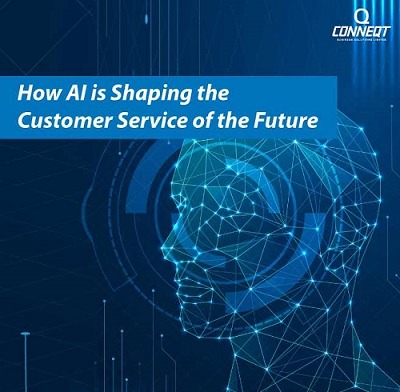
The technological breakthroughs in AI are poised to take every industry by the storm. AI powered services have picked up its fastest pace. The advanced systems powered by automated solutions have enabled the users to make a restaurant reservation, book a movie ticket, hotel room, order a pizza and even make an appointment at a clinic. Artificial Intelligence is reimagining customer service industry by automating processes, and disrupting how we work.
The rapid implementation of AI can be accredited to innovations such as machine learning and natural language processing. AI-powered digital solutions are gradually becoming a part of the customer service interactions. Experts believe that AI has the capability to enable real-time self-service for customer service platforms.
According to a study by Zendesk, 42% customers are more likely to purchase after experiencing a good customer service, whereas 52% could stop being a customer after a single negative customer service experience. Thus, customer service still remains a decisive factor in customers making the purchase.
According to a recent report by Gartner, nearly 55% of well-established organizations have either started making investments in the potential of AI or are planning to do so by 2020. With customer service assuming far more importance, companies are turning towards artificial intelligence.
AI in Customer Service
Automation let’s you deliver the next-level of responsiveness that’s not humanly possible. Al is also currently being implemented to replace human agents at some levels and augment them. AI assists the human executive in having a smooth conversation with the customer. The machine listens to the discussion in real-time and feeds information to the representative for a better response. By 2020, 85% of the customer support interactions are expected to be conducted without any customer services representatives. According to Oracle, 80% sales and marketing leaders either use or plan to use chatbots in the near future. ValaAfshar, Chief Digital Evangelist at Salesforce predicts that, “The line-of-business that is most likely to embrace AI first will be the customer service – typically the most process oriented and technology savvy organization within most companies.”
The AI embedded systems are capable of monitoring an infinite amount of website as well as in-app activity to spot distress indicators, identify customers experiencing issues/concerns and what those issues are. These systems can respond in real-time and offer support via virtual service agents or FAQ’s across devices and platforms.
By resolving customer service issues before they arise you can significantly lower the customer abandonment rates in the buying cycle, reduce customer complaints and enhance customer satisfaction.
AI has not reached a stage where it can completely replace the entire human customer service system. However, it is possible that perfectly human-like, AI could become a reality in the near future. Currently, AI is heavily incorporated to improve the customer service and customer experience. Studies prove that organizations can improve compliance by 30% and agent satisfaction by 90% by integrating AI.
Let us look at some of the present uses of AI in customer service.
AI-powered messaging
Messaging has changed tremendously in the past few years. Studies show that 90% of the customers today want to use messaging for communicating with businesses. Interestingly, 86% of customers also look for an option to transfer to a live person to resolve their query. This complex need puts companies in a difficult position where they have to ensure the best of both worlds to provide a delightful customer experience.
The success of the AI-powered bot largely depends on the available data and intuitive features provided to the customers. At Conneqt, we provide AI augmented messaging where an AI bots assist the agent. So the basic information is provided by the bots, whereas the customer has the option to talk to a human representative as and when desired. The complex tasks are undertaken by the human, whereas the repetitive tasks are taken care of by the bots.
AI in Email
No customer wants to wait for 48-72 hours for receiving a reply to an email query. So, it becomes difficult for companies to read thousands of emails manually and reply to them within a given timeframe. AI-powered email can help the team to speed-up the process reducing the number of customer requests waiting for the reply. AI-powered technology can direct the email to the concerned department and also provide past responses to ensure a faster reply. To successfully implement the AI in an email, a huge amount of monthly data should be available for the machine learning.
AI in Research
It is certain that AI will make self-service interfaces a reality in the near future. However, AI can also be used in capturing and analyzing data for achieving excellent customer service experience. Al can help in identifying customer issues, determine preferences based on past choice, and respond with a most-suited solution. Studies hint that personalization will be the key in the future and AI is a perfect solution to offer personalized offers, solutions, suggestions, and even resolve queries before they arrive.
While implementation of AI may appear to be a complicated process, the benefits can easily supersede the efforts. Let us look at some of the significant benefits.
Cost Efficiency
According to a Mckinsey report, about 29% of work done by customer service representatives has the potential to be automated. So by implementing AI companies can save a huge amount of money on training and hiring staff. On an average, it can cost $4000 to hire an agent and over $4800 to train them. With attrition and expansion, these costs are only going to multiply.
On the contrary, AI needs to be trained only once. If there are any changes down the line, the software can be re-configured. AI will also free the workforce of routine and repetitive task that they are tired of doing, thereby reducing the attrition rate and improving the employee engagement.
24*7 Customer Service
Public holidays or leaves of absence do not constrain automated services; AI is available 24*7. This enables your company to deliver excellent customer services and resolve queries as soon as they arrive. The customer would no longer have to wait for a day or two before seeing their query answered.
Chatbots are also free from any bias, or they do not take matters into their own hands. Unlike humans, chatbots can be programmed to never argue with customers and escalate the calls to managers in a customer query is not resolved. Artificial Intelligence and NLP technology work in conjunction to listen to customer interactions in real-time. This will reduce the average resolution time. Also, the agents won’t have to build expertise in all products and processes that makes it easy for enterprises to shuffle workforce across teams where the need arises, which in turn results in improved customer experience and enhanced brand reputation of your organization.
Self-service options
72% Millennials believe that phone calls are not the best way to resolve a customer service issue. Millennials want to solve the problem themselves by reading FAQs, researching on the internet, asking on forums, or messaging a bot. This changing trend will only grow stronger as the next generation would become even more self-reliant and expect automated self-service options. It is paramount for businesses to adapt early before the customer journey begins getting negatively impacted AI-powered the business’ bottom lines.
Panacea for all Customer Problems – No!
AI-driven models use the cognitive representation as the basis to understand the customer intent. It’s unrealistic to expect that a canned AI application can fit into your organization’s processes and take over the customer support. Enterprises need to tune and train the AI models to drive unique business cases relevant to their business verticals. Companies need to begin building data repositories, processes, and mechanisms which can assist AI models learn quickly. It’s equally important to build workflows that allow queries and complaints come to human service agents before the simulated interactions begin to annoy customers. So, the success of Artificial Intelligence powered customer service is much a function of technological advancement as of a firm’s abilities to train AI models for specific tasks with massive reliable data-sets. Customer service is getting bigger and better than ever. Most of the transformation is an outcome of Artificial Intelligence that paves the way forward for organizations.
Artificial Intelligence in customer service offers a wide array of benefits ranging from reliability to cost-savings. Conneqt offers automated customer service solutions that will enable real-time problem solving for your customers. The customized AI will fit the specific needs of your business ensuring that the customer is always delighted with the customer service.
1 note
·
View note
Text
Benefits and Advantages of VoIP for Business
VoIP phone system helps every part of an organization starting from the customer service department, sales team as well as the internal project teams. The VoIP phone system helps businesses grow their business strategies, improve their customer service and make their sales teams more effective
VoIP phone system helps every part of an organization starting from the customer service department, sales team as well as the internal project teams. The VoIP phone system helps businesses grow their business strategies, improve their customer service and make their sales teams more effective by the below mentioned ways:
Ensures you never miss a call
The VoIP phone system ensures you never miss a call. Even if your office is facing some connection problem or none of yours employees is present to take the call, the cloud based system comes to your rescue. A cloud-based VoIP phone system enables users to make and receive calls from anywhere, anytime. Whether your sales representatives are travelling or are away from the office, the VoIP phone system allows your customers to still reach them by phone.
Provides flexibility
The cloud-based VoIP phone system provides flexibility of having distinct phone numbers which helps you to create a level of trust for clients connecting from different locations.
Scale your business accordingly
Depending on your company requirements, cloud-hosted VoIP phone systems scale up or scale down your customer service. When your business grows, VoIP phone system allows you to boost the amount of calls your system can handle, or dial back the service to decrease expenses if your company has a quiet time.
Analyze the customer experience
VoIP phone systems helps in tracking the number of calls you receive throughout the day and the amount of time your customers spend on hold which in turn enable you to plan accordingly to improve your customer service.
Saves and control costs for your business
Average cost savings which businesses experience after implementing VoIP phone system ranges between 30-50%. A VoIP system handles everything off-premise and eliminates the expense of on-premise server equipments and their maintenance.
Enables simple conference calls
Businesses using a traditional phone service need to pay for additional services in order to host multiple callers for a conference. All such services are native to a cloud based VoIP phone system which enables users to make conference calls as an added benefit to the already paid service.
Easy integration with enterprise systems
Sales teams use several kinds of software to monitor and schedule their job. A VoIP system integrates with CRM software or other business software easily enabling sharing of data between the two.
A sales officer has to look up and write down client data before making a call with a traditional phone system. In order to complete assignments, they need to constantly switch between a laptop, phone, and even pen and paper. VoIP makes things simple. A salesperson from inside Salesforce can call a client directly without losing their place in the software and the Salesforce automatically captures call details including time and duration after the call ends.
1 note
·
View note
Text
Artificial Intelligence - Critical Prerequisite of Clinical Trials
A vast majority of researchers and specialized tech startup companies have started investing in developing Big Data and Artificial Intelligence (AI) tools to serve the pharmaceutical and medical devices companies, which is believed to transform the clinical trial process. But what exactly is the main outcome of AI?
The buzz around AI in clinical trials is due to its potential as the lynchpin for dramatically improving the probability of success and reducing the timelines.

How does AI really increase Clinical Trial Success Rates?
The answer lies in predictive analysis from available historical data. The main idea of the AI revolution is to bring about “efficient and faster decision making”, provide precision in clinical trials and bringing an effective product from the lab-to-market. The average timeline for a drug molecule to be released from lab-to-market is 9 years with a median development cost of $2 billion. The objective of AI implementation is to eliminate unnecessary repeated clinical evaluations, save costs & time and thereby ensure successful clinical trials.
AI based Clinical Trial transformation process can be divided into three main components:
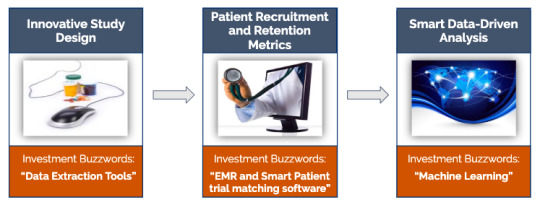
Innovative Study Design
The first and foremost prerequisite for AI implementation is data mining.
Cross-comparison analysis of historical similar molecule protocol designs
Centralized Monitoring of Trial Risks
Measuring Drug Responses, Trial Outcomes, and Site Performance Prediction
Patient Recruitment and Retention Metrics
The optimum utilization of patient data will ensure effective patient recruitment and lower dropout rates. Several AI startups such as “DEEP6” and “antidote” have invested in developing patient trial matching software.
Tapping EMR/EHR to match the right patient trials
Patient eligibility Good-fit analysis for trials and predicting precise responsiveness
Smart Data-Driven Analysis
Effective Go/No-Go decision for every stage of the clinical trial process
Artificial intelligence is now being used for predicting cancer treatment type based on the combination of genes in the clinical trials right in the planning stage.
Predictive result analysis based on the drug molecule behavioral pattern
Dynamic Real-time access to data and sharing as and when there are updates
Leverage AI in Clinical Trials with Salesforce Einstein Platform Enablement
Cloudbyz has developed a CTMS solution natively built on Salesforce Platform with the flexibility to integrate AI tools and strategies complementing the end-to-end clinical trial process.
The Salesforce Einstein platform can act as a smart assistant which can be integrated into Cloudbyz CTMS. The Einstein Voice and Einstein predictive builder can help leverage artificial Intelligence in clinical trials in the following ways:
Discover insights: The Einstein Discovery feature enables CROs and Sponsors to analyze every data point, pulling together data from external sources, to create an effective study design in the planning stage of a clinical trial.
Predict outcomes: The Einstein Prediction Builder feature can be used to build a customized predictive score model to analyze required patient data tapped from EHR / EMR. Based on the analysis score, the closest trial outcomes can be predicted to match the patients suitable for the clinical study.
Recommend: The platform also enables users to analyze site performance metrics, which will help in recommending appropriate sites for selection based on responses.
Automate routine tasks: All monitoring activities for scheduling monitoring visits, audit trails, approval of documents, reporting and updations based on recommendations can be automated at any stage with Cloudbyz Centralized RBM solutions. All the activities and reminders can be set up hands-free using Einstein Voice feature.
The Final Word
Investment in AI and Big Data will certainly improve the clinical trial process. However, initial investments on tools and technologies need to be taken into consideration. Further, market experience with AI tools will bring down the costs and time-to-market of the drug. How AI can transform the drug discovery process, and make the above statement true - Only time will tell.
References
https://www.himss.org/library/ehr
https://www.himss.org/electronic-medical-records
https://www.ijclinicaltrials.com/index.php/ijct/article/download/125/94
https://www.jpmorgan.com/commercial-banking/insights/ai-transform-clinical-trials
https://healthcareweekly.com/artificial-intelligence-clinical-trials/
http://www.ia-grp.com/views/3_types_artificial_intelligence_clinical_research/
http://www.clinicalinformaticsnews.com/2017/09/29/the-intelligent-trial-ai-comes-to-clinical-trials.aspx
https://www.salesforce.com/in/products/einstein/overview/
https://www.salesforce.com/video/193342/
https://www.salesforce.com/products/einstein-analytics/products/einstein-discovery/
https://www.salesforce.com/products/einstein-analytics/products/einstein-discovery/#prediction-builder
https://www.salesforce.com/products/einstein/einstein-voice/
Further queries or thoughts please comment or feel free to contact:
Srinivas Sashidhar K
Domain Specialist - Life Sciences
Cloudbyz Inc.
Email: [email protected]
Linkedin: https://www.linkedin.com/in/srinivas-sashidhar-27449a15/
1 note
·
View note
Text
How Salesforce Consulting Can Help Unlock Your Business Potential?
In today's rapidly changing business landscape, it's crucial to be ahead of the competition and adapt to changing market trends. That's where Salesforce consulting comes in. Salesforce consulting company is a cloud-based platform that offers a wide range of tools and solutions for businesses of all sizes. With its robust features, Salesforce can help streamline your business processes, improve customer engagement, and ultimately unlock your business's full potential. However, navigating the complexities of Salesforce can be overwhelming, and that's where a Salesforce consulting firm can help. In this article, we'll dive into the benefits of Salesforce consulting and how it can help your business grow and thrive in today's competitive market. So, whether you're a small business owner or a large enterprise, read on to discover how Salesforce consulting can take your business to the next level.
Understanding Salesforce Consulting
Salesforce consulting is the process of hiring a team of experts to guide your business through the complexities of the Salesforce platform. These experts can help you identify the areas where Salesforce can have the most significant impact on your business and develop a customized plan to make the most of the platform's features.
Salesforce consultants can provide a wide range of services, from developing a strategy for implementation to training your team on how to use the platform effectively. They can also help you integrate Salesforce with other tools and systems you're currently using to ensure a seamless transition.
Working with a Salesforce consulting firm can help you save time and money in the long run. Instead of trying to figure out Salesforce on your own, you'll have a team of experts guiding you every step of the way.
Benefits of Salesforce Consulting for Businesses
There are numerous benefits of working with a Salesforce consulting firm. Here are some of the most significant advantages:
1. Improved Efficiency
Salesforce consulting can help you streamline your business processes, making your team more productive and efficient. By automating manual tasks and creating workflows, you can reduce the time it takes to complete tasks and free up your team to focus on more critical projects.
2. Better Customer Engagement
Salesforce provides a 360-degree view of your customers, allowing you to personalize your interactions and create a more engaging customer experience. With the insights provided by Salesforce, you can anticipate your customers' needs and provide them with the solutions they're looking for.
3. Increased Revenue
By improving efficiency and customer engagement, Salesforce consulting can help you increase your revenue. With a better understanding of your customers' needs, you can develop targeted marketing campaigns and sales strategies that are more likely to convert leads into customers.
4. Scalability
Salesforce is a highly scalable platform, meaning it can grow and adapt to your business's changing needs. Salesforce consulting services can help you develop a roadmap for growth and ensure that your Salesforce implementation is scalable and flexible enough to meet your business's future needs.
Salesforce Consulting Statistics
Here are some statistics that highlight the impact Salesforce consulting can have on your business:
Salesforce can increase sales productivity by up to 44%.
Salesforce can reduce customer support costs by up to 27%.
Companies that use Salesforce see an average increase in sales revenue of 32%.
These statistics highlight the significant impact that Salesforce can have on your business. By working with a Salesforce consulting firm, you can take advantage of these benefits and unlock your business's full potential.
Salesforce Consulting Strategy
Developing a Salesforce consulting strategy is essential to ensure that your Salesforce implementation meets your business's unique needs. Here are some of the key components of a successful Salesforce consulting strategy:
1. Identify Your Business Objectives
Before implementing Salesforce, it's crucial to identify your business objectives and how Salesforce can help you achieve them. This will help you develop a customized Salesforce solution that meets your business's unique needs.
2. Develop a Roadmap
Once you've identified your business objectives, it's time to develop a roadmap for implementing Salesforce. This roadmap should outline the key milestones and deliverables for your project and ensure that everyone involved in the project is on the same page.
3. Choose the Right Salesforce Products
Salesforce offers a wide range of products and solutions, and it's essential to choose the right ones for your business. A Salesforce consulting firm can help you identify the products that will have the most significant impact on your business and ensure that they're integrated seamlessly into your Salesforce implementation.
4. Provide Training and Support
Finally, it's crucial to provide training and support to your team to ensure that they can use Salesforce effectively. A Salesforce consulting firm can provide customized training tailored to your business's unique needs and ensure that your team has the support they need to succeed.
Salesforce Implementation Process
The Salesforce implementation process can be complex and time-consuming, but working with a Salesforce consulting firm can help simplify the process. Here are the key steps involved in implementing Salesforce:
1. Discovery
During the discovery phase, your Salesforce consulting team will work with you to identify your business objectives and develop a customized Salesforce solution that meets your unique needs.
2. Design
The design phase involves creating a customized Salesforce solution that meets your business's unique needs. This includes designing workflows, creating custom fields, and configuring reports and dashboards.
3. Development
During the development phase, your Salesforce consulting team will build the customized Salesforce solution that was designed during the previous phase. This includes configuring your Salesforce org, building custom applications, and integrating Salesforce with other systems.
4. Testing
Once the development phase is complete, your Salesforce consulting team will extensively test your Salesforce implementation to ensure that it's working correctly and meets your business's unique needs.
5. Deployment
Finally, your Salesforce consulting team will deploy your Salesforce solution to your team and provide training and support to ensure that they can use Salesforce effectively.
Conclusion
Salesforce consulting can help unlock your business's full potential by streamlining your business processes, improving customer engagement, and increasing revenue. By working with a Salesforce consulting firm, you can develop a customized Salesforce solution that meets your business's unique needs and ensures that you're taking full advantage of the platform's features. Whether you're a small business owner or a large enterprise, Salesforce consulting can help you achieve your business objectives and stay ahead of the competition in today's rapidly changing business landscape.
0 notes